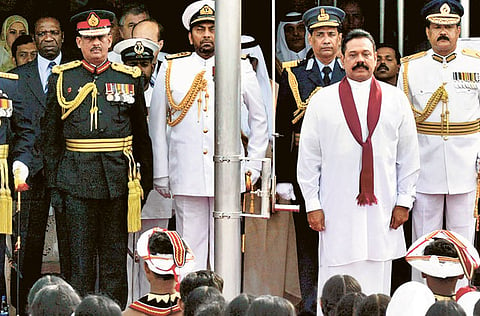Fonseka 'politically victimised', will carry on fight to clear his name
Ex-general will continue in politics and campaign for next polls, MP says

Dubai: A key member of Sri Lanka's parliament who negotiated with President Mahinda Rajapakse for the release of Sarath Fonseka from prison, has said that the former army general was politically victimised and would carry on the fight to clear his name and gain favour with the electorate.
Speaking to Gulf News in a telephone interview from Colombo, Tiran Alles, said: "Fonseka is in a defiant mood and motivated to prove his innocence. We must not forget that he (Fonseka) has been doing this for some time. From the day he came into politics and campaigned during the elections so be assured that he will not be deterred."
The Democratic National Alliance, formed by Fonseka, is one part of a group of five parties that make up the opposition in Sri Lanka. They contested in the 2010 elections but had a poor showing. Alles, who is a close associate of Fonseka, is a member of the Janata Vimukti Peramuna Party (JVP) which is part of that alliance.
Strained relationship
"I have been negotiating with Rajapakse for Fonseka's release for the past six months," said Alles. "I too had a strained relationship with the President since 2007, but he met me and we started talking. My party members and members of Fonseka's family used that moment to see if we could achieve something. It took many months, but we achieved what we wanted."
According to Alles, "Fonseka was undoubtedly the victim of a political vendetta. There's nothing else to think - he contested the elections against the president and lost and then went to prison." This time the former general could gain traction with the people. "Fonseka will continue to be in politics and campaign for the next elections," said Alles adding that his release could come with a caveat.
"We haven't seen the documents yet, but I have reason to believe that there are conditions. This could mean that he cannot campaign for seven years according to regulations. If this is true, we will have to launch a new initiative to get his rights back."
The conditional clause in Fonseka's release is believed to be a political masterstroke by Rajapakse in a bid to isolate the general before the elections in 2014. The government is gambling that the isolation would make Fonseka a persona non grata and increase the split in the opposition who lack a leader with the potential of being a unifying force.
Rajapakse is reportedly considering holding a general election next year in order to capitalise on the current strength in numbers that he enjoys and before a crucial Commonwealth Head of State summit to be hosted by Sri Lanka next September.
Any sort of rapprochement between the general and the president has also been ruled out by Alles. He is, however, aware of repercussions. "I am sure the government and the president knew that Fonseka would not keep quiet once he was out. But one day or another it had to happen. Now we will wait and see how things shape out. In politics it is difficult to predict the future, but in the light of all that has happened, it is tough to see Fonseka and Rajapakse call a truce. So we will rule that out."
Unhappy
On Fonseka's chances on making a political impact Alles said: "Politically people are unhappy. Economically they are unhappy. There is no good governance. This is why the masses are reacting for Fonseka. They want a leader who will rally for them. The government knows this, which is why the opposition is victimised. Unfortunately, we are also weak and want someone strong to lead us."
Sign up for the Daily Briefing
Get the latest news and updates straight to your inbox



